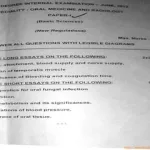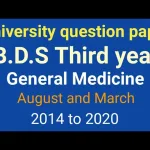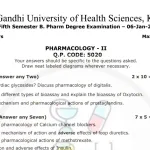BDS final year exams test the knowledge and skills of students in dentistry and related sciences. This comprehensive question and answer guide from February 2019 covers key topics in all subjects, making it a valuable resource for preparation. The format includes detailed answers to help students understand the concepts thoroughly.
General Medicine
Question: What is the most common cause of myocardial infarction?
Answer: The most common cause of myocardial infarction is the blockage of coronary arteries due to atherosclerosis.
Question: What are the clinical features of diabetes mellitus?
Answer: Clinical features include polyuria, polydipsia, polyphagia, weight loss, and fatigue.
Question: Define hypertension and its normal blood pressure values.
Answer: Hypertension is elevated blood pressure beyond normal values. Normal blood pressure is 120/80 mmHg.
Question: What is the treatment for acute asthma exacerbation?
Answer: Treatment includes bronchodilators like salbutamol, corticosteroids, and oxygen therapy.
Question: Explain the difference between Type 1 and Type 2 diabetes mellitus.
Answer: Type 1 diabetes is insulin-dependent, caused by autoimmune destruction of beta cells, while Type 2 is non-insulin-dependent and related to insulin resistance.
Question: Describe the pathophysiology of congestive heart failure.
Answer: It involves impaired cardiac output due to systolic or diastolic dysfunction, leading to fluid accumulation in lungs and tissues.
Question: What is the first-line treatment for essential hypertension?
Answer: First-line treatments include lifestyle modifications and antihypertensive drugs like ACE inhibitors.
Question: Name the complications of uncontrolled diabetes mellitus.
Answer: Complications include diabetic retinopathy, nephropathy, neuropathy, and cardiovascular diseases.
Question: Define stroke and its types.
Answer: Stroke is a neurological deficit due to interrupted blood supply to the brain. Types include ischemic and hemorrhagic stroke.
Question: What are the symptoms of hyperthyroidism?
Answer: Symptoms include weight loss, increased appetite, tremors, heat intolerance, and palpitations.
Question: What is the role of insulin in the body?
Answer: Insulin helps regulate blood glucose levels by promoting glucose uptake in cells and glycogen synthesis in the liver.
Question: What is the treatment for bacterial endocarditis?
Answer: Treatment includes intravenous antibiotics, typically penicillin or vancomycin.
Question: What are the causes of anemia?
Answer: Causes include iron deficiency, vitamin B12 deficiency, chronic diseases, and blood loss.
Question: Explain the mechanism of action of beta blockers.
Answer: Beta blockers reduce heart rate and blood pressure by blocking beta-adrenergic receptors.
Question: What are the signs of dehydration?
Answer: Signs include dry mouth, sunken eyes, decreased urine output, and hypotension.
Question: Define jaundice and its types.
Answer: Jaundice is the yellowing of skin and eyes due to hyperbilirubinemia. Types include pre-hepatic, hepatic, and post-hepatic jaundice.
Question: What is the Glasgow Coma Scale used for?
Answer: It is used to assess the level of consciousness in patients with head injury or coma.
Question: Name the types of shock and their causes.
Answer: Types include hypovolemic (due to blood loss), cardiogenic (due to heart failure), and septic (due to infection).
Question: How is tuberculosis diagnosed?
Answer: Diagnosis is made through chest X-ray, sputum analysis, and Mantoux test.
General Surgery
Question: What is the definition of hernia?
Answer: A hernia is the protrusion of an organ or tissue through an abnormal opening in the body.
Question: What are the types of gallstones?
Answer: Types include cholesterol stones, pigment stones, and mixed stones.
Question: Describe the clinical features of appendicitis.
Answer: Features include right lower quadrant pain, fever, nausea, and vomiting.
Question: What is the treatment for varicose veins?
Answer: Treatments include compression stockings, sclerotherapy, and surgical vein stripping.
Question: Define abscess and its management.
Answer: An abscess is a localized pus collection caused by infection, managed by incision and drainage.
Question: What are the complications of peptic ulcer disease?
Answer: Complications include perforation, bleeding, and gastric outlet obstruction.
Question: Name the types of breast cancer surgery.
Answer: Types include lumpectomy, mastectomy, and axillary lymph node dissection.
Question: What is the difference between benign and malignant tumors?
Answer: Benign tumors are non-invasive and do not spread, while malignant tumors invade tissues and metastasize.
Question: Explain the stages of wound healing.
Answer: Stages include hemostasis, inflammation, proliferation, and remodeling.
Question: What are the causes of acute pancreatitis?
Answer: Causes include gallstones, alcohol use, hypertriglyceridemia, and infections.
Question: How is deep vein thrombosis treated?
Answer: Treatment includes anticoagulants, thrombolytics, and compression therapy.
Question: What is the primary cause of aortic aneurysm?
Answer: The primary cause is atherosclerosis, leading to weakened arterial walls.
Question: Define fistula and its types.
Answer: A fistula is an abnormal connection between two body parts. Types include anal, arteriovenous, and tracheoesophageal fistulas.
Question: What is the treatment for inguinal hernia?
Answer: Treatment involves surgical repair using mesh (herniorrhaphy or hernioplasty).
Question: What are the risk factors for colorectal cancer?
Answer: Risk factors include family history, inflammatory bowel disease, and high-fat diet.
Question: How is post-operative infection managed?
Answer: Management includes wound care, antibiotics, and debridement if necessary.
Question: Define ischemia and its clinical significance.
Answer: Ischemia is reduced blood flow to tissues, leading to hypoxia and potential tissue damage.
Question: What is the management of burn injuries?
Answer: Management includes fluid resuscitation, wound care, and pain management.
Question: Explain the types of fractures.
Answer: Types include simple, compound, comminuted, and greenstick fractures.
Understanding the questions and answers from BDS final year exams in February 2019 is crucial for exam preparation. These questions cover key subjects like general medicine and surgery, ensuring students are well-prepared for their tests. With clear answers, this guide serves as a reliable reference to build knowledge and confidance.
Latest Posts
- Step-by-step guide to download and apply for jee mains admit card 202
- Comprehensive 2025 government holidays and recruitment details for job seekers
- JEE Mains Admit Card 2025: Your Step-by-Step Guide to Downloading the Hall Ticket
- Everything You Need to Know About 2025 Government Holidays Recruitment
- Comprehensive Guide to rrb d group recruitment 2025 – Eligibility, Vacancies, and Application
- Detailed guide to nps trust recruitment 2025 vacancies, eligibility and apply process
- Comprehensive guide to hpcl recruitment 2025 notification, vacancies, and application process
- ignou bed admission 2025 complete recruitment guide with eligibility and process
- Comprehensive Guide to Indian Army Agniveer Recruitment 2025 Notification and Jobs
- Everything You Must Know About CBSE Board Exams 2025 Changes & New Rules






